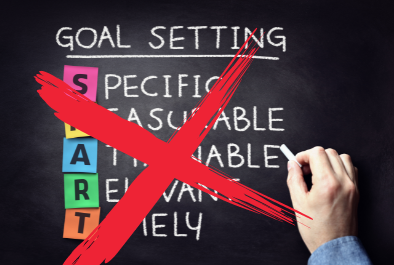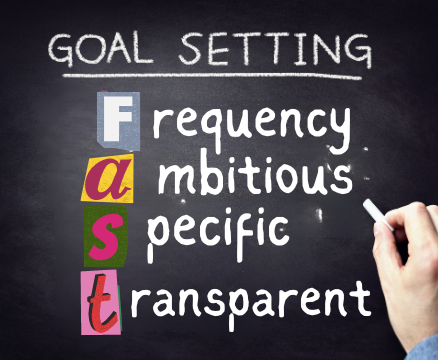Why I don't believe in setting s.m.a.r.t goals
I don't believe in SMART goals.
It's not that the process doesn't work.
It's that it isn't a realistic pattern of thinking for goal setting.
Why?
I'm glad you asked. Let's dive right in.

SMART is an acronym to describe a process of ensuring that whatever your goals are, your planning is robust enough to ensure success. It works by ensuring that your goals are Specific, Measurable, Achievable, Realistic and Timely.
Sounds like it's good, logical thought processing right?
Well, yea, but it's also a lot of detail to consider and the weight of all this means that a lot of people struggle with actually articulating their goals to the point that they don't often make it past this process
In the process of making sure that we're being SMART, we've made goal setting convoluted and, well hard.
Lemme explain
Specific
When people are dreaming their dreams, how many of them actually break away from that at the beginning and go "oh wait, that isn't specific enough. Let me analyse that a bit"?
Rhetorical question. People don't do that.
No really, if you're someone that finds this process tricky, let's say you set a goal and then typically the person you're working with will say something like "that's not detailed enough, be more specific"
And then how does that make you feel?
Kind of deflated right? Or frustrated that what is already a difficult process just became that much more so? You've got a goal but you don't really have enough of a goal?
The people that really need help with achieving their goals aren't out their thinking analytically about their dreams in their first step.
It's not that they don't need to, it's that it shouldn't be their first step in the process.
Let the dreams soar a little first.
Measurable
Measurement is not the second thing you should be thinking about at the goal-setting session.
If you're in the process of setting goals, you shouldn't be considering metrics yet. That step comes much later, when you've nailed the details more.
Why? If you're breaking away at this point to check how you'll track progress, you've already interrupted your own progress. Just get the damn goal out of your head and onto paper. We can refine it later!
Achievable
Really? We're at the point of dreaming about what we want to do and all of a sudden we're going to stop dreaming and start analysing whether we've got the skills to do that?
Now we're no longer dreaming, we're out there googling how to get the skills to make our dream reality, or working out how many people we need to support us to sell however many widgets that might involve.
Know who that doesn't work for? People that get distracted easily.
Relevant
We're dreaming here people. Goals aren't always relevant to the now. That's why they're a goal.
Relevance is always an important thing to consider, but it doesn't always need to relate to the goal setting itself. Goals are future-oriented, long-term. They're not always relevant in the moment of setting them.
Work on making them relevant later.
Time-bound
In part I kind of agree with this; If you don't set a point of time to achieve your goal, it's just a pipe-dream.
If you don't specify when you want to, you'll probably never achieve it because you've not given yourself the permission to go and do it.
But, and that's an important but, I still don't believe that we should be specifying a timeframe at the goal setting stage.
Like metrics, that comes later in the process.
So now I've hacked up the SMART process, wanna know my preferred method?
FAST goal setting.
This method still requires you to get clear on your goals, but it reprioritises the thinking around how you're setting them.
FAST is also an acronym, and stands for Frequency, Ambitious, Specific and Transparency.
Let's break it down
Frequency
Anyone that's ever worked with me has heard me bang on about regular planning sessions. That's applicable to goal setting as much as it is to planning out the actions.
In an ideal world, I advocate for an annual planning session to work out what your big dreams are, and then to fall into a 13-weekly high-level review of your big picture plan (this is both a progress review, reset and revision against your goals), and in between those 13-weeks aim for smaller goal setting sessions at a regular time built into part of your team meetings or, if you're a solopreneur, take the time to look at your goals every month as you reflect on what is going well and what you need to adjust.
While that might seems like a lot if you're only used to taking part in an annual planning process, its really just a reframe of time. Instead of spending hours (HOURS) at a time 2-3 times a year; break it down into smaller, more frequent chunks of intentional revision and planning - perhaps at your regularly scheduled meetings, or at an additional catch-up.
What it does do is gets you in the habit of thinking more strategically, and more intentionally.
In turn that drives efficiency of process.
When you're in a habit, it doesn't take as long to warm up and down, so more frequent goal setting = more efficient planning.
It ensures that your goals are always top of your mind, which in turn ensures you are always consciously working towards them.
Bonus, you're less likely to get distracted by other things when your brain is focused on the bigger picture.
You can absolutely work on a more spaced-apart planning cycle, but your chance of success is much higher when you are actively working on something frequently; People that create plans and file them for 352 days of the year are more likely to get distracted than those that are actively (frequently) engaged in the process throughout the year.
Ambitious
You need to challenge yourself.
If you're only ever shooting for middle of the road then mediocrity is your friend.
There's nothing wrong with that, but if you're someone that wants to achieve big things then you're not going to get there by playing it safe.
Most people have big dreams in at least one area of their life. The ones that say they don't are usually hiding it for fear of judgement from others.
Here's the freeing thing about goal setting. You don't have to tell everyone about it. It's your dream, not theirs.
Remove the fear of failure and taste the freedom to pursue your dreams. Imagine how good success would feel.
Now here is where I kind of eat my previous words. Kind of.
Specific
How will you know you have achieved your goal?
Where SMART guides us to getting clarity on the actual goal to the point where flexibility kind of goes out the window, and then dives even further into the measurable and time-bound categories by recommending the use of metrics / KPIs and a timeframe, I firmly advocate against that level of detail at the goal setting stage.
I believe its more important to ask yourself how you will know you have arrived at your destination - aka, how will you know you've achieved your goal.
KPIs don't belong in goal setting, be specific certainly, but don't pigeonhole yourself.
Be really specific about what you want to achieve and how you will know you've done that so that you are clear, but don't be prescriptive about what that means so that you lack flexibility to move.
The prescribing of timeline and metrics comes in later, not at the time of articulating your goals
And that leads us to the final component of FAST goal setting:
Transparency
Your stakeholders need to know why you're working towards this goal.
YOU need to know why you're working towards this goal.
Transparency here is WHAT the goal is, WHY its important and HOW you'll know WHEN you've achieved it.
That doesn't mean you need to tell your competitors all of your business plans, but the people (WHO) that you need support from to achieve it most definitely need to know how they can contribute towards your success.
Isn't FAST the same as SMART, just presented differently?
I can see how you'd think that, but no.
SMART goal setting creates pressure. Pressure to ensure that your goals fit specific criteria from the outset, and pressure to ensure that they have a very clear timeframe involved to create urgency.
FAST goal setting still asks you important detail, but it doesn't require answering all of the questions from the outset.
Look, what I can tell you from helping countless people through the planning process is that we overthink things so much in business, and that makes them so complicated that people never want to touch their damn plans again.
By reducing that pressure and making sure that goals are able to be drawn out of their head, the people that struggle with planning feel a release and can see their way through freely to want to continue the process.
Planning doesn't have to be complicated. It can be fun.
Don't change the process of working out how to make dreams come true into an ordeal of faux urgency and jargon.
What matters is that people have clarity over what they actually want to achieve, and then can see their way forward to getting there.
FAST goal setting can be summed up easily as:
- Get in the habit of regularly asking yourself what goals you have (Frequency).
- Dream big (Ambitious).
- Be clear on what you want to achieve (Specific).
- And tell people what help you might need from them. (Transparency).

